Dear Friends,
A new year is upon us, leaving behind a raging summer in which the State of Israel lived through a never-ending torrent of rocket attacks, soldier and civilian deaths, casualties, an army call-up of 40,000 reserve troops, and a 50-day slow-down in the economy. For many, recovery from Operation Protective Edge will take time. Fortunately, as a whole, the nation is resilient, and we are emerging strong from the recent security situation.
About 80 Medical Center doctors, nurses, paramedics, and aids were called up for military duty. Read about their heroism and life-changing experiences. Throughout this very difficult period, we have continued our commitment to care for patients with world-class medical expertise, services, and accommodations.
We wish you, our dear friends, a blessed New Year filled with good health and hope.
Warm regards,
Ronit Blum
CEO, The Association of Friends

Fundraising event raises over 1 million shekels for Pediatric Intensive Care Unit
In early July, the Kolber family, dedicated friends of the Tel Aviv Sourasky Medical Center, in collaboration with the Claro Restaurant in Tel Aviv’s new Sarona Center, hosted about 150 friends of the Medical Center, an event whose proceeds will be directed to constructing a new children’s intensive care unit. The dinner was prepared under the direction of celebrated Chef Ran Shmueli. The affair earned over one million shekels towards this important cause.
Medical Center CEO, Prof. Gabi Barbash, applauded the attendees, emphasizing that the truly generous donations deserve heartfelt appreciation and recognition, particularly considering that today’s complicated reality impacts all of us, both in spirit and in substance.
The new ICU will give children with highly acute medical conditions the most progressive environment and equipment with which to be treated.
.jpg)
Former violinist with essential tremor regains the ability to play during brain surgery
Naomi Elishuv, a former Lithuanian National Symphony Orchestra violinist, stopped playing 20 years ago after being diagnosed with a condition called essential tremor. In September, Elishuv was operated on at the Medical Center to suppress her tremor symptoms. While the surgery was being performed, she returned to playing the violin without disturbance.
Professor Yitzhak Fried, the Director of Functional Neurosurgery, explained the procedure. “We implanted a brain pacemaker to suppress the tremor. To place the electrode in the optimal location, we asked Elishuv to play the violin during the surgery. The surgery was performed under local anesthesia.”
“My greatest love was playing the violin, but…my tremor prevented me from playing professionally. I am now finally returning to life,” Elishuv says. Prof. Fried adds, “This is the first time that I have operated on a patient who played an instrument during surgery, and I enjoyed our private concert from a most talented and honorable musician". View this inspirational video of Elishuv playing Mozart during the surgery.
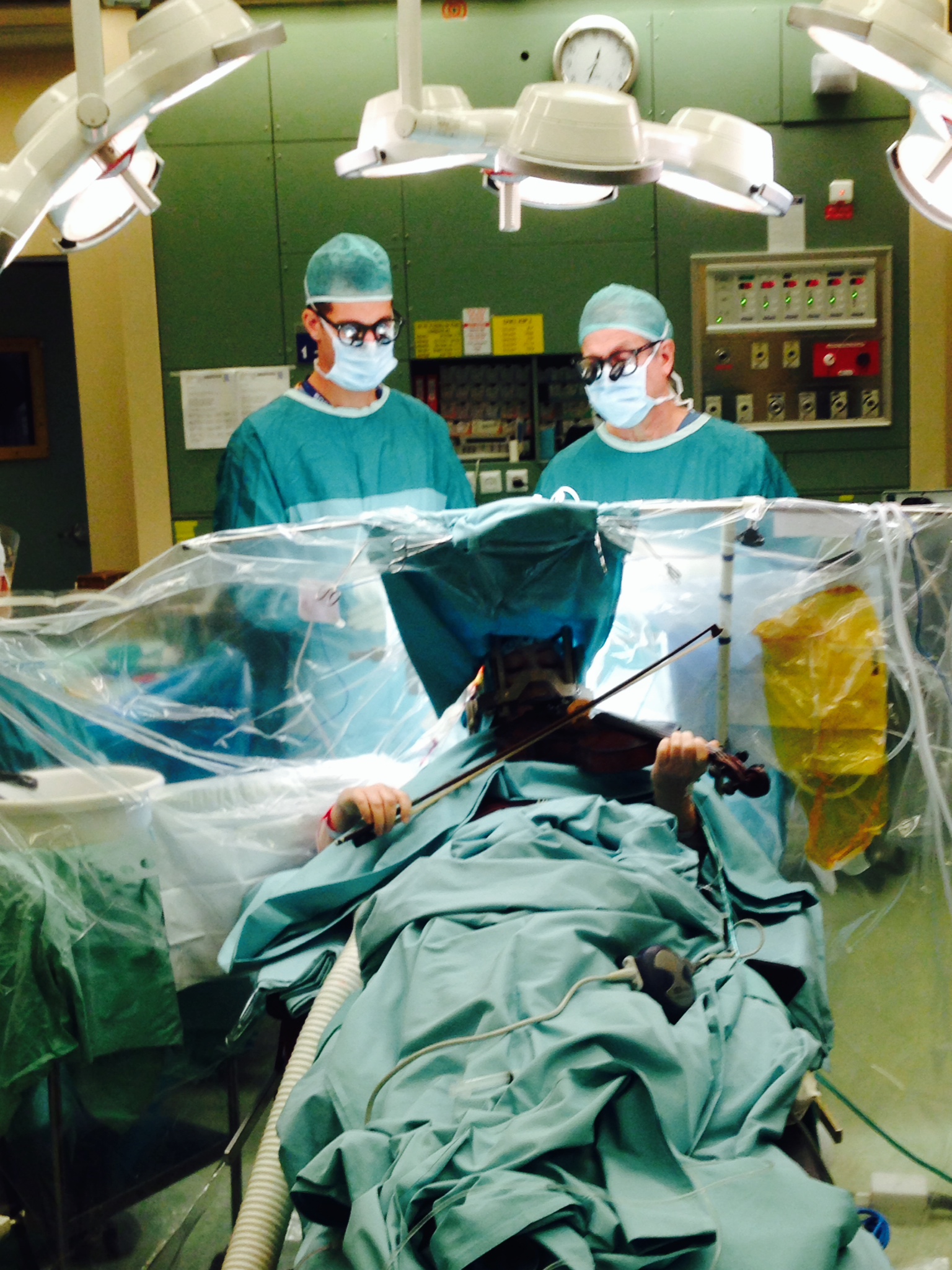
Donations
The Ted Arison Family Foundation
The Ted Arison Family Foundation has again made a most generous donation to renovate the Ted Arison Medical Tower. Our special thanks and appreciation to the fund’s chairperson, Jason Arison and Ms. Shari Arison. Thanks to Shari’s initiative, in 2001, we were able to build the tower, which was the founding cornerstone of our hospitalization facility plan. The ongoing support of the Ted Arison Family Foundation in providing the infrastructure to care for thousands of patients every year merits our distinct acknowledgement.
Alexander Grass Foundation
Roger Grass* and his sister Elizabeth Weese, residents of Pennsylvania in the US, Co-Chairs of the Alexander Grass Foundation, are showing their support and appreciation of the Medical Center with a generous donation to the research efforts of Dr. Ido Nachmany, the Director of the Surgery B Unit and Dr. Oren Shibolet, the Head of the Liver Unit in the Department of Gastroenterology. These physicians are researching the role of gut microbiota in drug-induced liver injury, targets for preventing or treating hepatocellular carcinoma, and genetically characterizing liver and pancreatic cancer. Our special thanks to the esteemed Grass family.
* Roger Grass moved to Israel a few years ago. His son, Samuel, serves in the Israeli army. Samuel was lightly injured in the recent Protective Edge military operation.
What’s New?
Operation Protective Edge: Medical Center workers on the military front line
About 80 doctors, nurses, para-medical employees and administrative, nursing-aid and support staff members were called up for emergency military service and joined combat and care efforts in the recent Israel-Gaza conflict. Participants agreed that, “We went as envoys and returned with such great fulfillment and pride.”
Here are several stories of reservists who braved their lives for the country:
Dr. Dror Levine, Director of the Pediatric Hemato-oncology Clinic at Dana-Dwek Children’s Hospital
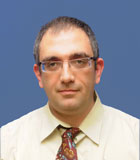
Dr. Levine was assigned as a regiment commander to one of the medical companies stationed at the Gaza border. He summarizes the operation with painful emotions: “I received way more soldiers fighting for their lives as I should have, and way too many soldiers who died tragically.”
Levine describes his challenging experience in the field, “It is not easy to treat very seriously wounded soldiers. You see young boys, fighters who, despite their injuries, want to return to battle to support their friends.”
According to Levine, the night battle in Shuja'iyya, where Golani soldiers were injured, was especially difficult. “The Golani comrades arrived one after another with very severe injuries. There were a lot of wounds from shrapnel, bullets, and bombs and anti-tank weapons, as well as blast injuries. What we did in the first few seconds they arrived made the difference between life and death for these amazing, courageous soldiers.”
Dr. Levine sorely missed the children of the Hemato-Oncology Department, who waited for his return from battle. “Treatment for a child with cancer is all-encompassing, and it was difficult for me to not be by their side. But, when you are treating wounded soldiers, you are doing something dramatically important, so the kids understand. Occasionally, I called the patients; one mom even sent me a care package to the battlefront, which was really touching.”
Michael Kireev, Urgent Care Nurse
Michael was called up for reserve duty, responsible for the entire Kissufim Post and Ein Hashlosha (The Three Springs), bordering the Gaza Strip. As an armored-ambulance driver, Kireev drove patrol with the soldiers responsible for Israel’s Gaza command.
In the first strike under Kireev’s command, Major Amotz Greenberg and two other soldiers were killed by an anti-tank missile. Kireev recalls, “Following this terribly destructive strike, we fought terrorists emerging from tunnels dug under civilian Israeli towns. They targeted anti-tank missiles directly at my ambulance, which by some miracle, passed about 2 meters above my head.
“Each day, when I returned from battle, I would thank G-d that I returned safe and sound, since I never knew how my patrol would end. There was hardly any patrol that didn’t require our finger on the trigger of a cocked gun,” explained Kireev. “My love of my country and concern for friends and family helped keep me going. There wasn’t one reserve soldier who wasn’t proud to fight against terror. We were not dominated by fear, but by pride, honor, and might against the unknown.”
Dr. Hagai Sherman, a physician in the Egoz Reconnaissance Unit
Dr. Sherman completed his medical internship at the Tel Aviv Medical Center, with his long-term goal to train to be an orthopedic surgeon. When he enlisted in the army in 2012, he was a general physician with the Egoz ground forces commando unit. However, at the outset of Operation Protective Edge, he began treating the complete spectrum of wounded soldiers.
During the fighting, Sherman’s elbow was injured from shrapnel, which severed part of the main nerve that controlled the palm of his hand. He consulted his peers at the Medical Center and was operated on to restore nerve function. Dr. Sherman knows he has a long road of physical therapy ahead of him, but is cautiously optimistic about his recovery. He is hoping to return to full function in the army and to fulfill his dream of being an orthopedic surgeon. His fellow doctors at Tel Aviv Sourasky Medical Center will be waiting for him.
.jpg)
Courtesy of Yedioth Ahronoth
Ofer Almog, MD, MHA, Resident in the Anesthesia, Pain and Intensive Care Division
Dr. Almog recounts his experience in a tunnel-destroying battalion in his own words:
I believe that the young men and women at the front line deserve the best medical care in case of injury. For Operation Protective Edge, I volunteered to fight for the safety of our country, and was designated to be an infantry company physician and fighter.
Our battalion was charged with locating and destroying a tunnel rooted in a Gaza neighborhood. We cleared the area by foot, while combat engineers dealt with explosive devices along the way. After finding and blowing up the tunnel, we hiked back across the border into Israel and were joined by an armored transportation convoy.
The next thing I remember is seeing a bright light and hearing a sharp noise that changed instantly to a loud beep. After checking myself (all my limbs were there), I was quite sure that I wasn't seriously wounded. The guy next to me wasn't as fortunate. I dragged him to a safer spot, where I put a tourniquet over the stump of his leg. Then, I saw a soldier unsuccessfully trying to stop massive bleeding from a fellow soldier’s neck. I put pressure on the wound and stopped the bleeding. This wounded soldier, Ran, was still conscious, and I promised him he would be all right.
I barely had time to take command, when I was then called to treat a patient with severe breathing difficulties using a surgical airway management procedure.
After turning these injured soldiers over to backup physicians and paramedics, I turned my focus to managing this provisional “field hospital.” We lost five friends that day—four that I declared and one that passed away in the hospital—while more than a dozen were injured. After the last helicopter took off, I evacuated myself. I noticed that my helmet had stopped at least one piece of shrapnel, and my vest, a couple more. I was very lucky to have "only" a blast injury.
When I was discharged from the hospital, I visited the injured soldiers and spoke with bereaved families. Ran had survived his injury; he received life-saving treatment at the Tel Aviv Sourasky Medical Center and is rehabilitating well. He remembers everything I said in the field (shouting my orders with my fist in his neck), including my promise. After that he remembered nothing.
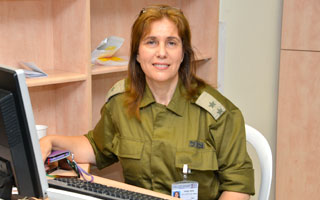
Lili Keydar, Administrative Manager of the Imaging Division, served emergency reserve duty for Operation Protective Edge
Lili Keydar, Army Reserve Lieutenant Colonel, headed the patient care unit and worked with their families in the Barzilai Medical Center in Ashkelon. Keydar recalls one very difficult situation of a soldier who received a severe jaw injury. “When I looked at him, he was conscious and I thought that maybe he could talk on the phone to his parents. But, unfortunately, he couldn’t speak and I was the one who notified his parents. I accompanied them during the process with great hope and I prayed for his recovery—that his beautiful face would heal. He recovered quickly and my heart just soared with excitement at his progress,” said Keydar.
The Tel Aviv Sourasky Medical Center is certified for the international ISO 27799 information security standard
The Medical Center received certification for the International Standards Organization codes of practice for information security. ISO 27799 provides instruction guidelines for securing information for medical and health organizations. The project was initiated by the Ministry of Health, which requires healthcare institutions to comply with the standards. Among the preparations needed to receive certification, the Medical Center’s Information Technology team conducted a risk assessment and a penetration test to confirm that the infrastructure provides a secure solution to data security and cyber threats.
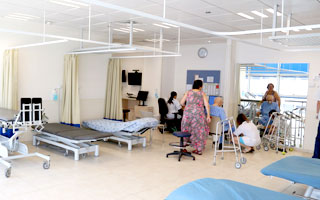
New home for the Physical Therapy Institute
The Physical Therapy Institute recently moved to its new facility on the second and third floors of the Rehabilitation Building. The new accommodations are spacious and furnished with professional state-of-the-art equipment. Generous donations from the Porter Foundation and the Claims Conference funded this initiative, which provides patients across the spectrum of ages and medical conditions world-class care in a comfortable setting.
Dana-Dwek Children’s Hospital projects benefit kids and their families
A number of important projects have been completed at Dana-Dwek Children’s Hospital and more are underway. These investments help provide even more progressive treatment and make patient stays more comfortable for children and their families:
- New General and Orthopedic Surgery Department inaugurated
The Dana-Dwek Children’s Hospital inaugurated the new General and Orthopedic Surgery Department. Thank you to the Dwek family, the Samouha family, the Legziel family, Rebecca Gridish, Ruth Parsol and the many other generous donors who made this renovation possible for the hundreds of children treated in the department each year.

- Pediatric hospitalization department to be renovated
Shortly, construction will begin on the new third-floor hospitalization department thanks to the generosity of the Dwek family, Rina Aharoni, of blessed memory, and other committed donors.
- A new garden for Dana-Dwek patients
Recently, we kicked off a project to construct a new garden next to the Dana-Dwek Children’s Hospital so pediatric patients and their families can sit and play outside while visiting or being treated on the Medical Center campus.
- State-of-the-art Pediatric Intensive Care Unit
A fundraiser was held recently to launch the planning of the renovated pediatric intensive care unit for patients needing acute medical care. The project, which will double the current ICU capacity and outfit the unit with state-of-the-art equipment, will cost about $5 million.
A round of applause
An exceptional accomplishment: Medical Center awarded 10 prestigious competitive grants
Earning 10 prestigious grants is a huge achievement for researchers and the hospital. Nine researchers won these 10 exclusive competitive grants from: the Israeli Science Foundation (ISF), the United States – Israel Binational Foundation (IBF), and the Israeli Cancer Research Fund (ICRF). The Medical Center is proud of its outstanding researchers who continuously pursue excellence in medicine and science. Grantees include:
ISF grants
-
Prof. Zelig Eshhar and Prof. Ella Naparstek,
Department of Hematology: Personal research grant
This multiple myeloma immunotherapy research aims to genetically engineer patients’ killer T cells outside the body so that when they are infused back into the patient, they will reject and eliminate malignant cells.
- Prof. Eli Sprecher, Chair of the Department of Dermatology:
The joint ISF-National Science Foundation of China genome-wide association study focuses on pemphigus vulgaris, one of the most severe skin diseases; the project, conducted in Israel and China is expected to reveal novel therapeutic targets for pemphigus and related autoimmune disorders.
- Dr. Ido Wolf, Head of Medical Oncology: Personal research grant and excellence prize
The study found that a novel mutation in the D538G estrogen receptor may be the reason that estrogen-receptor-positive metastatic breast cancer patients become resistant to hormone therapies, such as tamoxifen. This discovery may lead to the development of new endocrine treatments for patients who develop resistance to currently available endocrine treatments.
- Dr. Anat Mirelman, Scientific Director, Movement Disorder Unit: Program of Dr. Mirelman’s choice in the personal track
This study defines and quantifies motor cognitive reserve (MCR) to both elucidate the mechanisms by which MCR is utilized, for new insights into the neural networks that control complex motor function, and its relationship to cognitive function. Defining MCR will help identify individuals at risk of unsuccessful aging or neurodegeneration, and potentially guide interventional approaches to aging, disease progression, dementia or functional decline.
- Dr. Ehud Zigmond, Resident, Gastrointestinal and Liver Disease Clinic: Heritage grant for research conducted by physician researchers in hospitals
This study assesses the role of monocyte-derived cells and fractalkine in the pathogenesis of primary biliary cirrhosis. Study results could deepen understanding of the basic mechanisms involved in autoimmune liver disease development, potentially leading to targeted therapies.
- Dr. Tal Shahar, Department of Neurosurgery: Heritage grant for research conducted by physician researchers in hospitals. Dr. Shahar was recently selected to join the Medical Center’s Adopt-a-Researcher Program and was awarded a 3-year grant to advance his research. His research goal is to develop a new brain tumor treatment paradigm using biological agents. Small interfering RNAs (siRNAs) can strongly inhibit genes essential to cancer development and progression. These molecules will be delivered to the brain tumor using exosomes, natural occurring nanoparticles produced by bone marrow mesenchymal stem cells. These stem cells will serve as natural “biofactories” to produce exosomes that carry anti-tumor siRNAs. This approach couples a novel treatment modality with a new delivery method, and could revolutionize the treatment of brain tumors, and possibly all cancers.
BSF grants
- Prof. Eli Sprecher, Chair of the Department of Dermatology
The funded project, conducted in parallel in Tel Aviv and at Stanford University (under the supervision of Prof. Peter Marinkovich) will investigate the role of the IGFBP7 protein in psoriasis with the aim to translate this new knowledge into innovative treatment approaches.
- Dr. Ehud Zigmond, Resident, Gastrointestinal and Liver Disease Clinic
The study, conducted in partnership with Prof. M. Eric Gershwin, at the University of California at Davis, assesses the role of dendritic cells, specifically distinct hepatic subsets, in the pathogenesis of primary biliary cirrhosis. The objective is to improve the understanding of PBC mechanisms to pave the way to novel cell-specific targeted therapeutic strategies.
ICRF grants
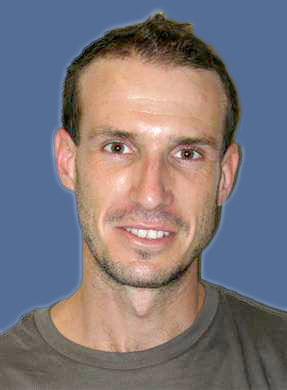
Dr. Niv Pencovich, Surgical Resident: Dr. Pencovich was awarded a 3-year grant to pursue his research as part of the Adopt-a-Researcher Program.
Other awards:
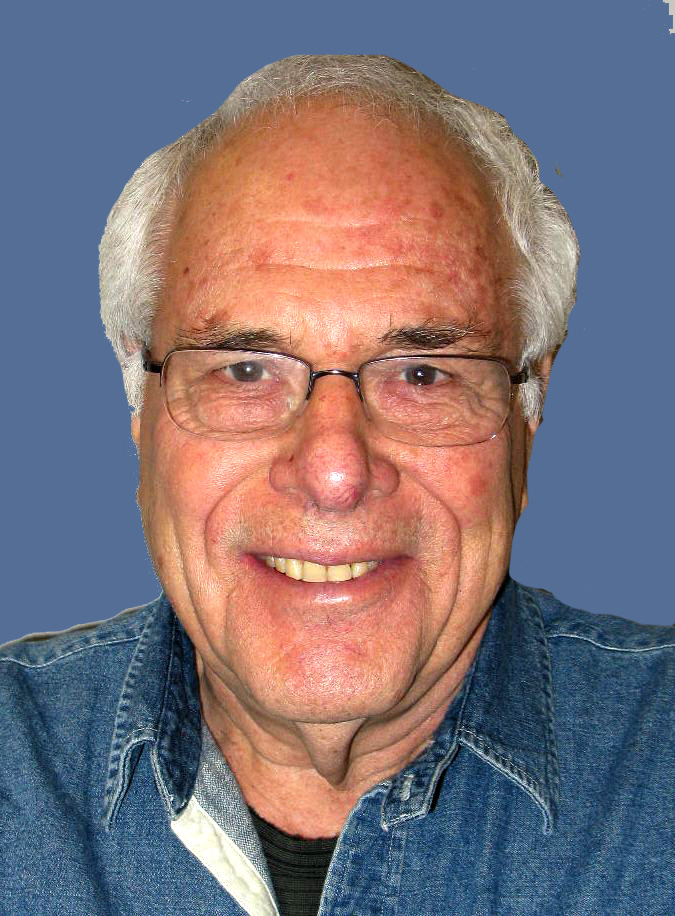
Prof. Zelig Eshhar:
2014 Pioneer Award for Seminal Work in Gene and Cell Therapy, Journal of Human Gene Therapy
2014 Massry Prize for Cancer Therapy and Immunomodulation
A first for the Medical Center: the implantation of the most advanced arrhythmia monitoring device
The Medical Center recently implanted the state-of-the-art monitoring device for a patient with arrhythmia, which is 90% smaller than the previous model. Device capabilities include automatic monitoring, recording, and data storage for three years. The patient’s heart rate data is transmitted in real time to a physician’s system, should a medical emergency arise.
Dr. Rafael Russo, Head of the Medical Center’s Atrial Fibrillation Service, explained that the device can identify sudden unpredictable rhythm disorders at a very precise level, so that patients and caregivers can respond quickly to changing medical conditions. The device is designed for patients experiencing fainting spells—to detect arrhythmias occurring over an extended time period that are not discovered under brief Holter monitoring. Made by Medtronic, this intravenous implant is called an implantable loop recorder.
Research excellence
The Tel Aviv Sourasky Medical Center: home to excellence in medical and scientific research
Each year, Medical Center earns consecutively more Israeli and international competitive grants. This achievement attests to the excellent research that the Medical Center laboratories conduct. Because of this increase in grants and work demand, specifically from prestigious organizations, such as the European Union and the National Institutes of Health (NIH), the R&D Department has appointed Dr. Galit Cohen as the Director of the Grants and Intellectual Property Unit.
The unit coordinates between the researchers and the local and international competitive grant organizations, helping researchers work with these institutions while proceeding full speed ahead with their research.
How blood vessels support tumor progression, Dr. Niv Pencovich
The progression of cancer from a microscopic dormant lesion into a malignant tumor requires the support of blood vessels. Studies have revealed that the recruitment of immature myeloid cells (IMCs) is key to tumor vascularization and progression. Dr. Niv Pencovich, Tel Aviv Sourasky Medical Center Surgical Resident has recently determined that unique gene expression patterns dictate the preferential recruitment of IMCs into malignant versus dormant tumors. This implies that interactions between tumor cells and IMCs affect IMCs’ abilities to infiltrate and function within the tumor microenvironment.
Dr. Pencovich’s research objectives are to understand the specific molecular mechanisms by which tumor cells and IMCs interact. The comprehensive genome-wide data collected will allow the researchers to construct a model of the networks in the tumor-IMC relationship related to tumor vascularization and progression. This model may help predict important new pathways that govern this delicate process. Targeting these pathways could deregulate IMC recruitment and function, which may lead to novel anti-cancer therapy aimed at keeping tumors dormant for the long term.
This study was funded by the Israel Cancer Research Fund (ICRF). Preliminary data was published in the March 2013 issue of Genes and Immunity. The title of the article is: "Unique expression patterns associated with preferential recruitment of immature myeloid cells into angiogenic versus dormant tumors," with authors: Niv Pencovich, S. Hantisteanu, O. Wurtzel, M. Hallak, and O. Fainaru.
Cancer therapy using designer immune cells
Experts have pronounced immunotherapy one of the key breakthroughs in cancer treatment. Prof. Zelig Eshhar, Chair of Immunological Research in the Immunology Laboratory, is one of the worldwide pioneers in developing designer cancer-killing cells. His work was essential in determining the scientific basis for a new personalized cancer immunotherapy that genetically modifies human cells to eradicate cancer. Prof Eshhar has tested this approach in animal models for a variety of human cancers and has demonstrated its application in eliminating breast, pancreatic, colorectal and prostate cancers.
Prof Eshhar’s lab serves as the seed for the Medical Center’s Center of Cancer Research and Therapy, in collaboration with the Department of Bone Marrow Transplantation and the Hemato-Oncology Department. He is currently developing novel cells to treat multiple myeloma and breast cancer, with special emphasis on patient safety, efficiency and simplified administration. This research is funded in part by an NIH grant, in collaboration with US partners, and by the Israeli Science Foundation and the Association for Advancement in Medicine in Israel.
Tel Aviv Sourasky Medical Center researchers discover that the moringa oleifera plant kills pancreatic cancer cells
Research conducted in the Laboratory of Medicinal Plants and Cancer Research has discovered that the moringa oleifera plant kills pancreatic cancer cells. Experiments also revealed that moringa caused programmed cell death and increased pancreatic cancer cell sensitivity to chemotherapy. In addition, the plant inhibited the activation of a protein complex known to have a central connection between inflammation and carcinogenesis and cancer cell resistance to chemotherapy.
The Oncology Division’s state-of-the-art Integrative Medicine Research Laboratory investigates the effectiveness of medicinal plants in combination with chemotherapy and radiotherapy for reducing treatment side effects and increasing efficacy. The research was supported by The Edmond and Nadine de Rothschild Foundation and the Chaya and Kadish Shermeister Endowment, and received a research grant from the Faculty of Medicine of the Tel Aviv University.
Vibrating capsule safely and effectively treats constipation
Constipation affects millions of people every day around the world. Pharmacology solutions
have been a primary treatment method, but up to 50% of the population are not satisfied with this solution.
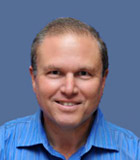
Dr. Yishai Ron, Director of Neurogastroenterology and Motility in the Department of Gastroenterology and Hepatology has discovered another alternative. In his pilot study, he proved that a vibrating capsule alleviates chronic idiopathic constipation and constipation-predominant irritable bowel syndrome. The pill-sized capsule contains a mini motor that starts vibrating while in the large and small intestines (6-8 hours after being swallowed). This stimulation produces contractions that help waste move through the digestive tract. Patients in the study reported that their number of bowel movements doubled and their elimination was less difficult. Patients reported no side effects from the treatment.
The Functional Brain Center helps guide new therapeutic methods as part of a global brain project
The Tel Aviv Sourasky Medical Center was one of 22 centers worldwide awarded grants by the EU’s Human Brain Project launched in 2013 to map and model human brain structure and function. Earning the award was the joint submission by the Functional Brain Center, headed by Prof. Talma Hendler and the Functional Neurosurgery Unit, headed by Prof. Itzhak Fried.
The project, led by scientist, Dr. Tomer Gazit, analyzes motivational decision-making processes using multi-scale measurements—from single-neuron activity to whole-brain functional MRI mapping. The team is studying how underlying responses to punishment and reward guide decision-making during conflict. Specifically, the team is studying the dynamics of approach versus avoidance behaviors. This research may help shed light on pathological brain mechanisms and guide new brain-targeted treatment.
Functional Brain Center research has also moved from diagnosis to treatment, developing tools for depicting deep-brain signals critical for regulating emotions and motivation. This innovative development uses high-cost non-portable methods, such as fMRI, to improve measurements and portable low-cost methods, such as EEG. With this, the center has initiated several clinical trials to train people how to modulate deep brain areas to improve emotional processing, motivation, and decision-making. Altogether, these cutting-edge investigations will guide new evidence-based therapeutic approaches in psychiatry and neurology.
Appointments
External appointments
- Prof. Nir Giladi, Director of the Neurology Department: Chair of the Neurology Teaching Circle, Faculty of Medicine, University of Tel Aviv
- Prof. Eyal Gur, Director of Plastic Surgery: Chairperson of the Israeli Society of Plastic and Aesthetic Surgery
- Prof. Anat Loewenstein, Academic Associate Dean, Sackler Faculty of Medicine, Tel Aviv University; Member of the European Academy of Ophthalmology - the first Israeli member of this prestigious organization
- Dr. Ido Wolf, Head of Medical Oncology: Head of the Clinical Board, Faculty of Medicine, University of Tel Aviv
Medical Center Appointments- Dr. Shlomi Cohen, Director of Pediatric Gastroenterology, Dana-Dwek Children’s Hospital
- Prof. Alex Greenstein, Director of the Urology Clinic
- Dr. Ahuva Gottreich, Director of the Laboratory Department
- Dr. Guy Lahat, Director of the Surgical Oncology Unit, Division of Surgery
- Dr. Nir Lubezky, Interim Director of the Liver Surgery Unit, Division of Surgery
- Dr. Jonathan Roth, Manager of the Pediatric Endoscopic Neurosurgery Service
- Dr. Mario Sofer, Director of Urological Endoscopy, Urology Unit
- Dr. Alex Zegerman, Interim Director of the Recovery Unit of the Anesthesia Department
New services
Lis Maternity Hospital launches a new app
Lis Maternity Hospital is offering an app that centralizes all the information and functionality that can help expectant mothers. AppLis includes:
- Tracking fetal movement and contraction frequency
- A week-of-pregnancy calculator that provides important information targeted to that pregnancy stage, including fetal changes, and pregnancy tips
- A baby name database
- Pregnancy image editor
- A personalized music playlist builder to be played while you are delivering
Comprehensive behavioral intervention for tics
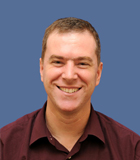
Tics, short repetitive movements or utterances, are the most common movement disorder in children. Comprehensive Behavioral Intervention for Tics (CBIT) is a novel non-drug treatment offered by the Pediatric Movement Disorders Center that gives children and adolescents behavioral tools to manage their tics. CBIT treatment is a highly structured therapy that trains children to be more aware of their tics and to perform competing behaviors when they feel the urge to tic. The therapy also educates children and parents on changes in daily activities to help reduce tics.
The Pediatric Movement Disorders Center, directed by Dr. Michael Rotstein, treats a range of abnormalities prevalent in children and adolescents in the execution or planning of voluntary movements, such as tics, dystonia, chorea, ataxia, and Parkinsonism.
